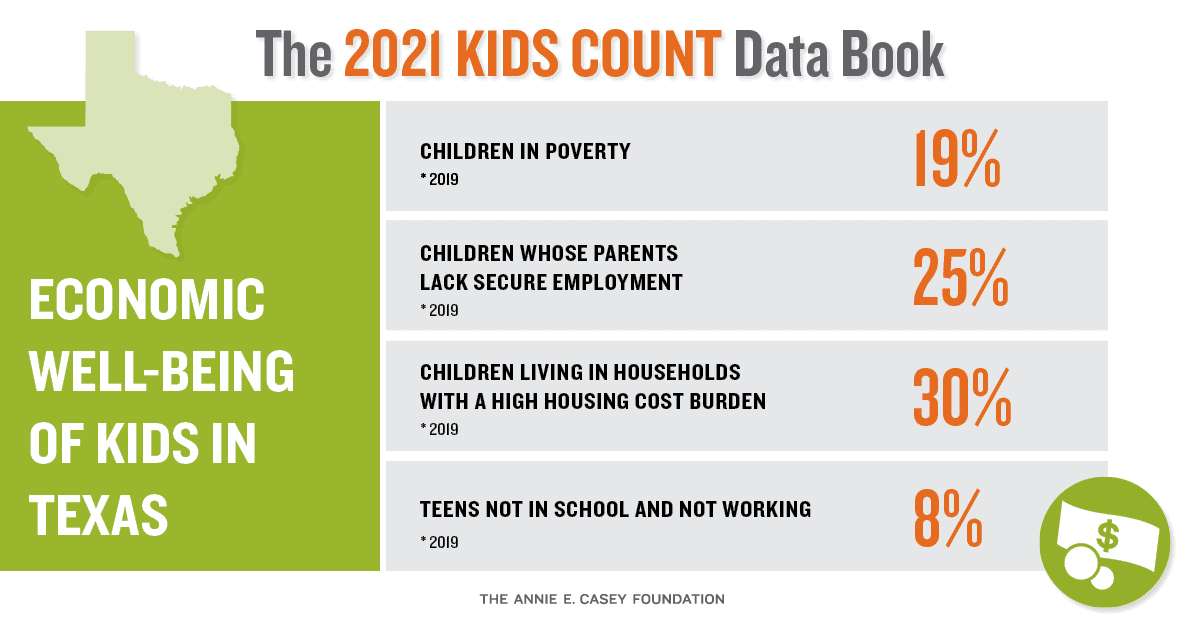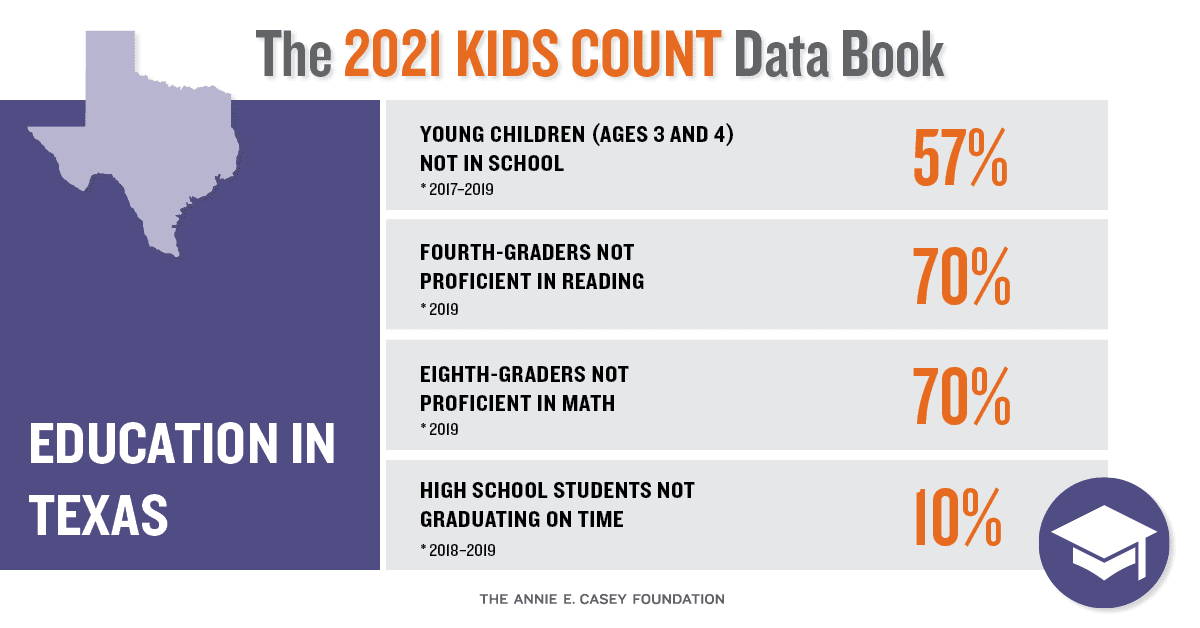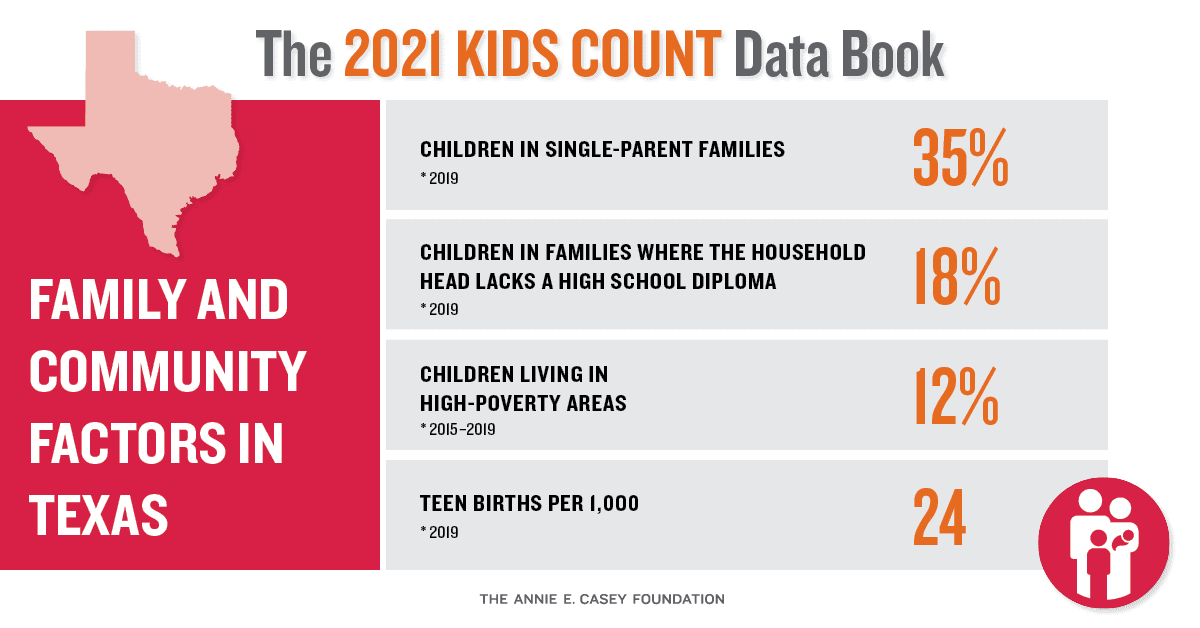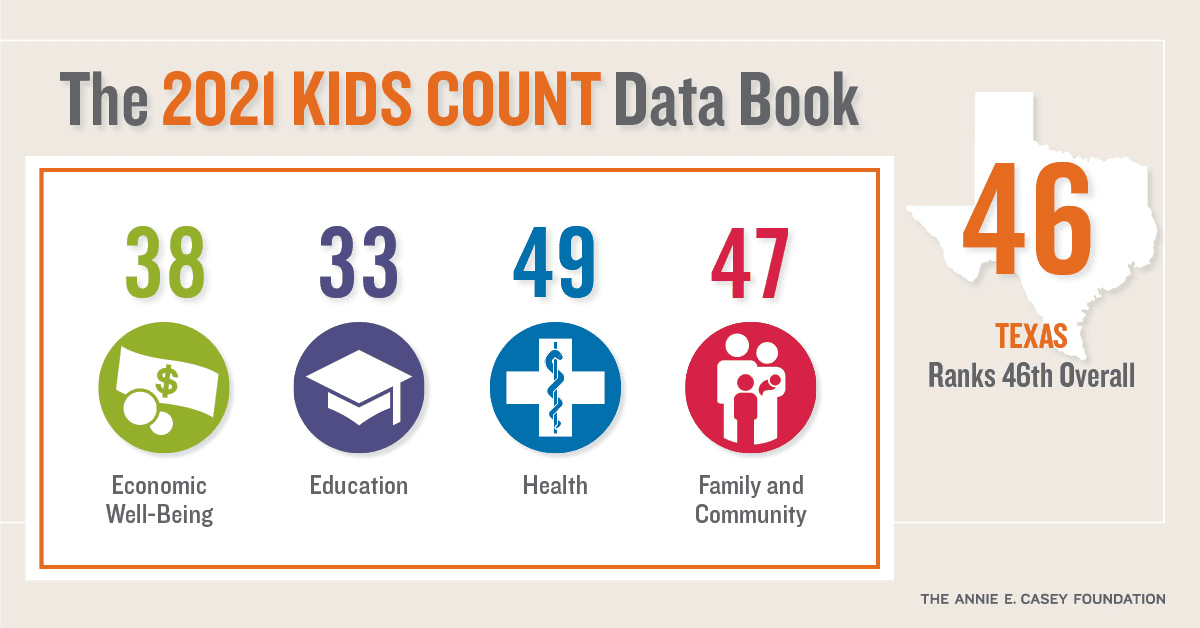The population of Texas children continues to grow, but we are still not adequately meeting the needs of our children and families. Texas is ranked as the 5th worst state in the nation for children, per today’s release of the 2021 KIDS COUNT Data Book. Over the past decade, Texas has consistently ranked in the bottom half of the nation when it comes to the overall well-being of children. As we grapple with the ongoing COVID-19 pandemic and look toward recovery, we must work together to create a more equitable and better-resourced Texas.
Lawmakers should focus on policies that can reduce structural inequities which have been exacerbated by the lingering effects of the coronavirus and a lack of responsive policy this legislative session. Practical policy solutions can improve the quality of life for every Texan.
A Need for Better Economic Well-Being
Child poverty levels have improved since 2010 (decreasing from 26% to 19%). But generational inequity and systemic racism continue to result in racial disparities for children and their families. In 2019, over 1.4 million children in Texas lived in a household with a family income below $25,936. One in four Black and Hispanic children experienced poverty, a situation the pandemic has only worsened. Policymakers should make the child tax credit permanent to help families care for their children.
A Need for Better Education
High-quality education can provide children with better educational opportunities and life outcomes. In 2019, 7 out of 10 students in the fourth grade were not proficient in reading in Texas. The same was true for eighth graders’ math proficiency. School funding has a direct impact on student achievement. Inequitable and inadequate funding throughout school districts has adverse effects on school quality. Adequate funding is necessary for schools to have smaller classroom sizes, hire additional school counselors and teachers, and offer a variety of courses. These resources ensure that students are career- and college-ready upon graduation. But as long as funding is closely tied to property taxes and attendance, students who reside in high-poverty communities or experience chronic absenteeism will receive less state and local revenue. Policymakers should work together to create a more equitable school funding formula.
A Need for Better Health Coverage
Educational and economic outcomes are also dependent on access to health care. When it comes to health care, Texas continues to lag behind all other states, ranking 50th in the nation. As explored in Every Texan’s recent report on Health Equity for Every Texas Child, Texas children are uninsured at rates over twice the national average. In Texas, nearly one million children lack access to health care, and the likelihood of being uninsured is higher for Hispanic children. Our Texas analysis provides key context on the importance of health insurance for children, the factors that contribute to a decrease in coverage, and practical policy recommendations on how to provide equitable health opportunities for all children. Texas can achieve better health coverage for children by following the lead of the 38 other states who have accepted federal funding for Medicaid expansion.
A Need for Better Family and Community Context
More than 860,000 children live in high-poverty areas in Texas. Due to residential segregation, redlining, and loan discrimination, 18% of Hispanic and 15% of Black children live in high-poverty areas. Families of color are struggling due to inequitable opportunities in education and employment, as well as a historical exclusion from wealth-building policies, which left them economically insecure entering the pandemic. Before the spread of COVID-19, Black and Hispanic families did not have stable access to secure employment and were often the first to face unemployment once the pandemic began. According to survey data from last year, Black and Hispanic households were twice as likely as White households to report lacking confidence in making their next rent or mortgage payment. The expansion of income support can assist families and communities in high-poverty areas.
Signs of Progress
While there is a lot of work to be done, there have been some policy wins for Texan children this past legislative session, including:
- Senate Bill 2081: Improves student-to-teacher ratio in prekindergarten classrooms by limiting the number of students in the class.
- House Bill 2256 and others: Improves bilingual education for students.
- House Bill 133: Expands postpartum Medicaid coverage to 6 months.
- House Bill 2658 (formerly 290): Provides continuous eligibility for Children’s Medicaid for 6 months.
Public policy rooted in social justice has the ability to provide better educational and economic opportunities for all Texas children. This past year has taught us that if we work together and put the needs of children first, we can create a Texas that is equipped to provide all its children with the resources necessary for a healthier and happier life.
About the Report
The KIDS COUNT Data Book is a 50-state report developed by the Annie E. Casey Foundation to analyze how families have fared between the Great Recession and the COVID-19 crisis. The Annie E. Casey Foundation uses sixteen indicators across four areas – economic well-being, education, health, and family and community – to measure child well-being in states and collectively as a nation.
Read the full report here.


![2021-health-Texas[1]](https://everytexan.org/wp-content/uploads/2021/06/2021-health-Texas1.png)

